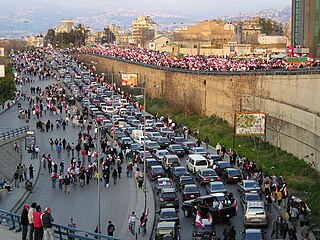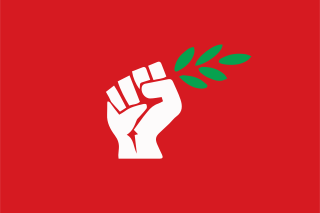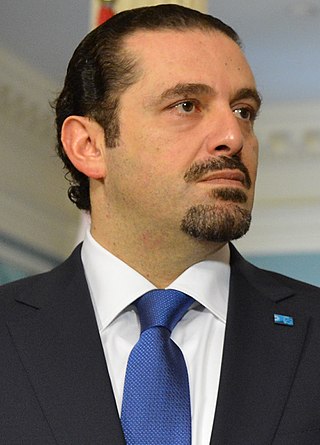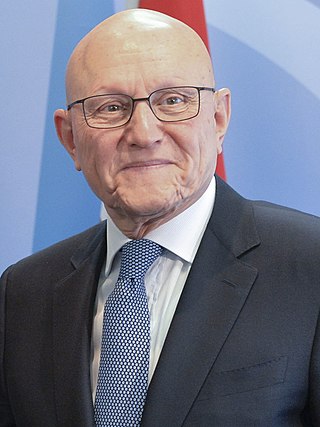| |||||
| Decades: | |||||
|---|---|---|---|---|---|
| See also: | |||||
The following lists events that happened in 2011 in Lebanon .
| |||||
| Decades: | |||||
|---|---|---|---|---|---|
| See also: | |||||
The following lists events that happened in 2011 in Lebanon .

Rafic Bahaa El Deen al-Hariri, also known as Rafiq al-Hariri, was a Lebanese businessman and politician, who served as the Prime Minister of Lebanon from 1992 to 1998 and again from 2000 until he resigned on 20 October 2004, before his assassination in 2005.

Michel Naim Aoun is a Lebanese politician and former general who served as the 13th President of Lebanon from 31 October 2016 to 30 October 2022.

Omar Abdul Hamid Karami was the 29th prime minister of Lebanon for two non-consecutive terms. He was Prime Minister for the first time from 24 December 1990, when Selim al-Hoss gave up power, until May 1992, when he resigned due to economic instability. He was again Prime Minister from October 2004 to April 2005.

The Cedar Revolution or the Independence Intifada was a chain of demonstrations in Lebanon triggered by the assassination of former Lebanese Prime Minister Rafic Hariri. The popular movement was remarkable for its avoidance of violence, peaceful approach, and its total reliance on methods of civil resistance.

Saad El-Din Rafik Al-Hariri is a Lebanese-Saudi businessman and politician who served as the prime minister of Lebanon from 2009 to 2011 and 2016 to 2020. The son of Rafic Hariri, he founded and has been leading the Future Movement party since 2007. He is seen as "the strongest figurehead" of the March 14 Alliance.

Fouad Siniora is a Lebanese politician, a former Prime Minister of Lebanon, a position he held from 19 July 2005 to 25 May 2008. He stepped down on 9 November 2009 in favor of Saad Hariri, the late Rafik Hariri's son. He is the leader of the parliamentary group of the Future Movement.

The March 14 Alliance, named after the date of the Cedar Revolution, was a coalition of political parties and independents in Lebanon formed in 2005 that were united by their anti-Syrian stance and by their opposition to the March 8 Alliance. It was led by Saad Hariri, Walid Jumblatt and Samir Geagea, as well as other prominent figures.

The 2006–2008 Lebanese protests were a series of political protests and sit-ins in Lebanon that began on 1 December 2006, led by groups that opposed the US and Saudi-backed government of Prime Minister Fouad Siniora and ended on 21 May 2008 with the signing of the Doha Agreement. The opposition was made up of Hezbollah, Amal, and the Free Patriotic Movement (FPM); a number of smaller parties were also involved, including the Marada party, the Lebanese Communist Party and the Syrian Social Nationalist Party. A majority of the members of the government were part of the anti-Syrian March 14 Alliance, a coalition of political parties and independents in Lebanon. The two groups were also divided along religious lines, with most Sunnis and Druze supporting the government, and most Shi'a supporting the opposition. The Christian community was split between the two factions, with Michel Aoun, the leader of the FPM, claiming to have more than 70% support among the Christians, based on the results of the 2005 parliamentary election.

Mohamad Chatah was a Lebanese economist and diplomat.

On 9 November 2009, after five months of negotiations following the 2009 parliamentary elections, Lebanese prime minister Saad Hariri formed a national unity government.

On 14 February 2005, former Prime Minister of Lebanon Rafic Hariri was killed along with 21 others in an explosion in Beirut, Lebanon. Explosives equivalent to around 1,000 kilograms of TNT were detonated as his motorcade drove near the St. George Hotel. Among the dead were several of Hariri's bodyguards and former Minister of the Economy, Bassel Fleihan.

Najib Azmi Mikati is a Lebanese politician and businessman who has served as the prime minister of Lebanon since September 2021. He also leads a cabinet that has assumed the powers of the president of Lebanon since the term of president Michel Aoun ended in October 2022. He has previously served as prime minister from April to July 2005, and from June 2011 to February 2014. He also served as Minister of Public Works and Transport from December 1998 to 2003.

The 2011 Lebanese protests, also known as the Intifada of Dignity or Uprising of Dignity were seen as influenced by the Arab Spring. The main protests focused on calls for political reform especially against confessionalism in Lebanon. The protests initiated in early 2011, and dimmed by the end of the year. In another aspect of the Arab Spring, Lebanese pro and anti-Assad factions descended into sectarian violence, which culminated in May–June 2012.

The formation of a new government led by Najib Mikati follows five months of negotiations after the fall of the Saad Hariri government. Mikati formed a controversial 30-minister cabinet. Following ruptures and tensions and two previous threats to resign, Mikati finally resigned on 23 March 2013. Tammam Salam was tasked to form a new government on 6 April 2013.

Adnan Hussein is a Lebanese political scientist, academic and politician who served as minister of state for social affairs in the cabinet led by Prime Minister Saad Hariri. He is a close ally of former Lebanese President Michel Suleiman.

Tammam Saeb Salam is a Lebanese politician who was the Prime Minister of Lebanon from February 2014 until December 2016. He also served as the acting President of Lebanon from May 2014 until October 2016 in his capacity as prime minister. He previously served in the government of Lebanon as minister of culture from 2008 to 2009.
The following lists events in the year 2017 in Lebanon.

In 2017, Lebanese Prime Minister Saad Hariri abruptly announced his resignation while he was in Saudi Arabia on 4 November 2017. Shortly thereafter, the foreign relations between both countries and allied regional neighbors became increasingly strained. On 6 November, Saudi Arabia claimed Lebanon declared war between the two states, despite leaders of Lebanon stating otherwise. On 9 November, Saudi Arabia, Bahrain, Kuwait, and the United Arab Emirates asked their citizens to leave Lebanon. The conflict is thought to be part of the larger Iran–Saudi Arabia proxy conflict.